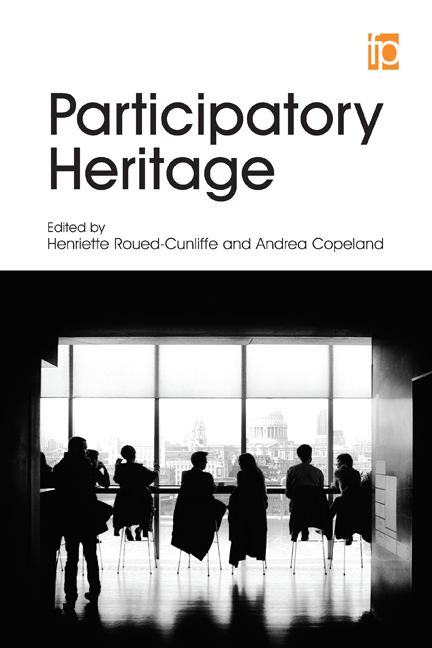Book contents
- Frontmatter
- Contents
- List of figures and tables
- Contributors
- Introduction: what is participatory heritage?
- Part 1 Participants
- Part 2 Challenges
- 8 Custodianship and online sharing in Australian community archives
- 9 Who is the expert in participatory culture?
- 10 Social inequalities in the shaping of cultural heritage infrastructure
- 11 No Gun Ri Digital Archive: challenges in archiving memory for a historically marginalized incident
- 12 Giving voice to the community: digitizing Jeffco oral histories
- 13 Issues with archiving community data
- Part 3 Solutions
- Further reading
- Index
8 - Custodianship and online sharing in Australian community archives
from Part 2 - Challenges
Published online by Cambridge University Press: 08 June 2018
- Frontmatter
- Contents
- List of figures and tables
- Contributors
- Introduction: what is participatory heritage?
- Part 1 Participants
- Part 2 Challenges
- 8 Custodianship and online sharing in Australian community archives
- 9 Who is the expert in participatory culture?
- 10 Social inequalities in the shaping of cultural heritage infrastructure
- 11 No Gun Ri Digital Archive: challenges in archiving memory for a historically marginalized incident
- 12 Giving voice to the community: digitizing Jeffco oral histories
- 13 Issues with archiving community data
- Part 3 Solutions
- Further reading
- Index
Summary
THE TWO RESEARCH projects reported on in this chapter explored issues of resourcing and sustaining the practice of sharing materials online, and had the goal of producing findings that can prove useful to community heritage organizations as well as those who seek to work with them. The purpose of the projects was to look not so much at the management of those collections but, rather, how they were to be accessed and how they could be used to engage their audiences. In the event, this resulted in a strong focus on social media. Social media use has been widely implemented by institutions within the GLAM (galleries, libraries, archives, and museums) sector over the past decade, and is valued as a vehicle for engaging audiences and contributing to an online presence or institutional brand. It is used by cultural institutions for a variety of purposes, particularly the promotion and marketing of services, events and collections. Social media also provides a platform through which cultural institutions can provide online access to their visual-based digital assets, such as digital reproductions of collections of photographs, illustrations, works of arts, objects, posters, ephemera and more.
It is evident, however, that approaches to the management of social media and the provision of online access to digital collections vary considerably across GLAM institutions. Although such institutions have many similarities, there are distinctions amongst them in terms of their organizational goals, audiences and access to resources. The benefits for GLAM institutions of providing online access to digital collections include raising their public profile, relevance and reach; yet, achieving the desired impact demands considerable commitments in terms of resources such as expertise, time and funding. Such resources tend to be constrained within the GLAM sector, supplemented only sporadically by small grants and fundraising. This is particularly the case for smaller heritage organizations such as local historical societies and community archives, within which there is a strong reliance on voluntary labour, and which are faced with ongoing concerns over their organizational sustainability. For example, they are often stretched to seek and maintain the necessary resources for collection development and the management of their holdings while simultaneously building their engagement with the broader community they aim to serve. In such circumstances, the provision of online access to digitized holdings may represent a key means of developing community engagement and relevance.
- Type
- Chapter
- Information
- Participatory Heritage , pp. 79 - 86Publisher: FacetPrint publication year: 2017
- 2
- Cited by



